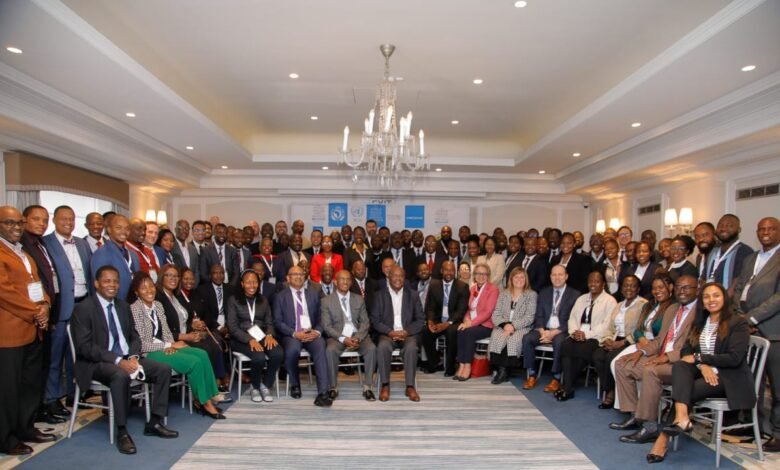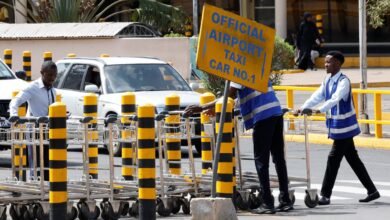
S&P Global Ratings said it’s stepping up its presence in Africa, including expanding its Johannesburg hub, as it seeks to dispel long-standing perceptions that international credit rating agencies contribute to the continent’s elevated cost of capital.
The move follows mounting calls for more inclusive and context-sensitive financial assessments, particularly in the wake of South Africa’s G20 presidency prioritizing the cost of capital as a key agenda item.
Some African leaders and stakeholders have advocated for the creation of a homegrown African credit rating agency to challenge the dominance of the “big three” global players—S&P, Moody’s, and Fitch—and to address what is widely viewed as an unjustified “Africa risk premium” imposed by foreign investors.
This shift comes just two months after the 2025 Africa Annual Conference on Credit Ratings (ACRC), held in Johannesburg, which built on the groundwork laid during the 2024 edition in Nairobi, Kenya.
The conference was themed “Unlocking Domestic Financing through Improving Credit Ratings,” and convened a wide array of participants including policymakers, economists, investors, rating agencies, and development partners.
Discussions focused on the structural flaws within current rating systems and emphasized the need to develop mechanisms that reflect Africa’s economic potential more accurately.
At the center of this renewed discourse was the urgent call for Africa to take ownership of its financial narrative. Kenya’s Principal Secretary for Investment Promotion, Abubakar Hassan, underscored the shortcomings of traditional credit rating models, stating that they often fail to account for Africa’s unique economic environments and investment opportunities.
He stressed that Africa-based rating agencies, equipped with deep local insight, could offer fairer assessments, improve investor confidence, and ultimately lower the cost of borrowing for African countries and corporates. “The time has come for Africa to take charge of its financial identity,” he said, pointing to the value of indigenous institutions in shaping a new financial future for the continent.
Also Read: African Union Faults Moody’s Over Kenya’s Credit Rating Revision
This sentiment was echoed by the Chairman of Kenya’s Capital Markets Authority, Ugas Mohamed, who noted that well-regulated and transparent credit rating frameworks are vital for fostering investment and managing risk effectively.
He argued that a robust regulatory environment could elevate the accuracy and credibility of credit assessments, making them more beneficial to the continent’s long-term economic trajectory.
In Cape Town, the 2025 conference also spotlighted practical steps toward reform. It was led by Metropol Group Managing Director Sam Omukoko, who focused on leveraging data and technology in improving credit rating systems.
Omukoko said enhanced data collection and transparency are critical for accurate credit profiling, pointed to the transformative “potential of artificial intelligence and machine learning in modernizing the credit rating process—especially in under-analyzed segments like SMEs, which are key engines of job creation and economic resilience in Africa.”
Ambassador Marie-Antoinette Rose Quatre, CEO of the African Peer Review Mechanism (APRM), called attention to a sobering reality: 22 African countries remain unrated, and very few corporations on the continent hold any form of credit rating.
This lack of representation hampers domestic resource mobilization and limits access to international financing and strongly backed the proposal to establish an African Credit Rating Agency (AfCRA), positioned to deliver more tailored and equitable assessments that can unlock greater investment flows.
The push for reform is grounded not only in principle but also in strategy putting into consideration the importance of aligning short-term financial instruments with long-term development goals.
Stakeholders stressed the need to invest in internal data systems, cultivate active engagement with rating agencies, and create regulatory safeguards that uphold the credibility and accountability of credit evaluations.
“The ultimate objective is to chart a path toward affordable capital, improved sovereign and corporate credit profiles, and a more empowered Africa within the global financial system.”
The conversation is shifting from critique to action even as the continent reimagines its credit framework, with growing momentum behind the creation of AfCRA, increased regional cooperation, and an overarching interplay between data, governance, and finance, the continent is positioning itself to redefine its creditworthiness on its own terms—and in doing so, reshape its economic destiny.






Why people still use to read news papers when in this technological globe all is accessible on web?
Hello, Neat post. There’s an issue together with your website in internet explorer, would
check this? IE still is the market chief and a big
component to folks will miss your fantastic
writing due to this problem.
Thanks , I’ve recently been searching for information approximately this topic for a long time and yours is the greatest I
have came upon so far. However, what in regards to the
conclusion? Are you positive in regards to the
supply?
Hello fantastic website! Does running a blog such as this take a great deal of
work? I have absolutely no expertise in coding
however I had been hoping to start my own blog soon. Anyway,
should you have any ideas or tips for new blog owners please
share. I know this is off topic nevertheless I simply had to ask.
Kudos!
Good article. I am facing a few of these issues as well..
Hi there! I simply want to offer you a big thumbs up for your excellent information you have here on this post.
I am coming back to your site for more soon.
What’s up, just wanted to say, I loved this post.
It was inspiring. Keep on posting!
Very rapidly this site will be famous among all blogging viewers, due to it’s
fastidious articles
Heya i am for the primary time here. I found
this board and I to find It truly useful & it helped me out much.
I’m hoping to provide one thing again and help others like you helped me.
Very soon this website will be famous among all blogging and
site-building users, due to it’s pleasant content
Ahaa, its nice conversation regarding this article at this
place at this blog, I have read all that, so at this time
me also commenting at this place.
Hi! I know this is kinda off topic but I was wondering if you
knew where I could get a captcha plugin for my comment form?
I’m using the same blog platform as yours and I’m having difficulty finding one?
Thanks a lot!
Aw, this was a really good post. Taking a few minutes and actual effort to produce a really good article… but what can I say… I procrastinate a lot
and don’t manage to get nearly anything done.
Hi there I am so delighted I found your site, I really found you by
error, while I was browsing on Aol for something else, Anyhow I am here now and would
just like to say cheers for a tremendous post
and a all round entertaining blog (I also love the theme/design), I don’t have time to read
through it all at the minute but I have book-marked it and also added your RSS feeds, so when I have time I will be back to read a great deal
more, Please do keep up the excellent work.
Good web site you have here.. It’s difficult to find quality
writing like yours these days. I honestly appreciate individuals like you!
Take care!!
Wow, that’s what I was searching for, what a data!
present here at this web site, thanks admin of this web page.
After all, what a great site and informative posts, I will upload inbound link – bookmark this web site? Regards, Reader.
We’re a group of volunteers and starting a new scheme in our community.
Your web site offered us with valuable information to work on. You have done a formidable job and our entire community will be thankful to you.
With havin so much content and articles do you ever run into any problems of plagorism or
copyright infringement? My site has a lot of completely unique content I’ve either created myself or outsourced but it looks like a
lot of it is popping it up all over the internet without my agreement.
Do you know any solutions to help stop content from being stolen? I’d
truly appreciate it.
If you wish for to improve your knowledge just keep visiting this web site and be updated with the most recent information posted here.
Pretty component of content. I just stumbled
upon your website and in accession capital to claim that I get in fact enjoyed account your blog
posts. Any way I’ll be subscribing on your augment or even I fulfillment you get right of entry to
persistently fast.
Pretty! This has been an extremely wonderful article. Thank you for providing these details.
I got this web page from my friend who shared with me regarding
this site and at the moment this time I am visiting this web site and reading very informative content at this
time.
Hi there, I discovered your site by means of Google at the same
time as searching for a similar matter, your site got here up, it
appears to be like great. I’ve bookmarked it
in my google bookmarks.
Hi there, simply was aware of your blog thru Google, and
found that it’s truly informative. I’m going
to watch out for brussels. I will appreciate in case you continue
this in future. Many people will likely be benefited from
your writing. Cheers!
You made some decent points there. I looked on the web for more info about
the issue and found most people will go along with your views on this web
site.
Very good info. Lucky me I ran across your blog by chance (stumbleupon).
I’ve bookmarked it for later!
Nice blog! Is your theme custom made or did you download
it from somewhere? A design like yours with a few simple adjustements would really make my blog shine.
Please let me know where you got your theme. Appreciate
it
I’m not that much of a online reader to be honest but your sites
really nice, keep it up! I’ll go ahead and
bookmark your website to come back later on. All the best
I was very pleased to find this web-site.I wanted to thanks for your time for this wonderful read!! I definitely enjoying every little bit of it and I have you bookmarked to check out new stuff you blog post.
Thanks for your marvelous posting! I truly enjoyed reading it, you could be a great author.I will be sure to bookmark your blog and will come back someday. I want to encourage you to continue your great job, have a nice weekend!
When I originally commented I seem to have clicked the -Notify me when new
comments are added- checkbox and now each time a comment is added
I recieve 4 emails with the same comment. Is there a means you are able to remove me from that service?
Many thanks!
Spot on with this write-up, I truly believe that this amazing
site needs a great deal more attention. I’ll probably be returning to see more, thanks
for the info!
I’m not sure where you are getting your info, but good topic.
I needs to spend some time learning much more or understanding more.
Thanks for great info I was looking for this info for my mission.
I am not sure where you’re getting your information, but good topic.
I needs to spend some time learning more or understanding more.
Thanks for excellent info I was looking for
this information for my mission.
Thanks for finally writing about > S&P Steps Up African Presence Over Rating
Bias < Loved it!
Why people still use to read news papers when in this
technological globe the whole thing is existing on net?
I visited a lot of website but I believe this one has got something extra in it in it
I have fun with, cause I found just what I used to be taking a look for.
You’ve ended my 4 day lengthy hunt! God Bless you man. Have a nice day.
Bye
Do you mind if I quote a couple of your articles as long as I provide credit and sources back to your website?
My website is in the very same area of interest as yours and my users would certainly benefit from a lot of the information you provide here.
Please let me know if this ok with you. Regards!
Hi there everybody, here every one is sharing such familiarity,
so it’s nice to read this blog, and I used to pay a quick visit this blog daily.
Thanks for finally talking about > S&P Steps Up African Presence Over Rating Bias
< Loved it!
It’s very trouble-free to find out any topic on net as compared to textbooks, as I found this article at
this site.
After I originally commented I seem to have clicked the -Notify me when new comments are added- checkbox and from now on whenever
a comment is added I receive four emails with the same comment.
Perhaps there is a means you are able to remove me from that
service? Thanks!
Hi there Dear, are you in fact visiting this web site regularly, if so
then you will definitely get fastidious knowledge.
Hey I know this is off topic but I was wondering if you knew of any widgets I could add to my blog that automatically
tweet my newest twitter updates. I’ve been looking for a plug-in like
this for quite some time and was hoping maybe
you would have some experience with something like this.
Please let me know if you run into anything. I truly
enjoy reading your blog and I look forward to your new updates.
Magnificent goods from you, man. I have understand
your stuff previous to and you’re just extremely fantastic.
I actually like what you’ve acquired here, certainly like what you are saying and the way in which you say it.
You make it entertaining and you still care for to keep it smart.
I can not wait to read much more from you. This is actually
a tremendous website.
What a material of un-ambiguity and preserveness of precious know-how concerning unexpected emotions.
Thanks for sharing your thoughts on InstaForex South Africa.
Regards
Hello! Do you use Twitter? I’d like to follow you if that would be okay.
I’m definitely enjoying your blog and look forward to new updates.
Hi, Neat post. There’s a problem with your site in internet explorer, would check this… IE still is the market leader and a huge portion of people will miss your fantastic writing because of this problem.
Hi, its pleasant article concerning media print, we all know media
is a wonderful source of facts.
This paragraph is actually a pleasant one it assists new net people,
who are wishing for blogging.
Hello there, just became aware of your blog through Google, and found that it’s really informative.
I’m going to watch out for brussels. I’ll be grateful if you continue this
in future. Numerous people will be benefited from
your writing. Cheers!
An outstanding share! I’ve just forwarded this onto a friend who had been conducting a little research on this.
And he in fact bought me dinner because I discovered
it for him… lol. So allow me to reword this….
Thanks for the meal!! But yeah, thanx for spending time to talk about this
matter here on your site.
I have read a few excellent stuff here. Definitely price bookmarking for revisiting.
I surprise how much effort you set to make this type of excellent informative site.
Its excellent as your other blog posts : D, thanks for putting up.
The 55clubapp is seriously addictive! So many games to choose from, and the interface is really smooth. Get it at 55clubapp, you won’t regret it!
There is certainly a lot to know about this subject.
I really like all of the points you have made.
Hello! Would you mind if I share your blog with my myspace group?
There’s a lot of folks that I think would really appreciate your content.
Please let me know. Thank you
Great work! That is the kind of info that should be shared
across the internet. Shame on the seek engines for now
not positioning this publish upper! Come on over and
discuss with my website . Thanks =)
I enjoy what you guys are usually up too. Such clever work and coverage! Keep up the wonderful works guys I’ve included you guys to our blogroll.
Very interesting details you have noted, thanks for putting up.